“And we have sent thee not, O Muhammad, but as a mercy for all peoples.”
Holy Qur’an 21:108
The Prophet Muhammad was a true prince of peace. He was patient in persecution and forbearing in victory. As a subject, he gave due rights to his rulers. As a ruler, he gave due rights to his subjects. He ensured every people could practise their own religion freely. He uplifted women from a position of servitude into one of respect and dignity. He insisted upon education of children, fair treatment of orphans, and compassion for the elderly. He stamped out racism and institutionalised charity in the Islamic conscience. Surely, there is no people on Earth that have not benefited from his merciful message.
The Prophet Muhammad in the Eyes of Non-Muslims
We present below a series of testimonies from non-Muslim writers on the character and achievement of the Prophet Muhammad, peace be upon him. They are adapted from an article in the magazine Review of Religions, documenting a sermon of the Caliph of the Ahmadiyya Muslim Community, Hazrat Mirza Masroor Ahmad. We hope that they will serve witness to unprejudiced minds as to the grandeur of this prophetic personality.
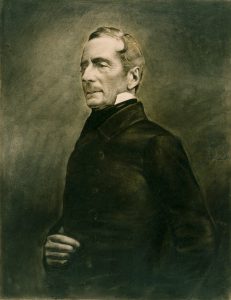
PRAT DE LAMARTINE
Lamartine
A French philosopher,
FROM HISTORY OF TURKEY: (1)
“If the grandeur of the design, the pettiness of the means, the immensity of the results, be the three measures of human genius, who would dare to compare humanly the greatest men of modern times to Mahomet? The most famous of them have agitated but armies, laws, empires; they have founded [when they founded anything] but physical potencies, often crumbled to the earth before themselves. Mahomet has recast armies, legislations, empires, peoples, dynasties, with millions of men, throughout a third of the inhabited globe. More than this, he recast altars, gods, religions, ideas, creeds, souls. He has founded upon a book, of which every letter is become a law, a spiritual nationality which embraces peoples of every tongue and race…”
“Philosopher, orator, apostle, legislator, warrior, conqueror of ideas, restorer of rational dogmas, the founder of twenty terrestrial empires and of one spiritual empire, that is Muhammad. As regards all standards by which human greatness may be measured, we may ask, is there any man greater than he?”
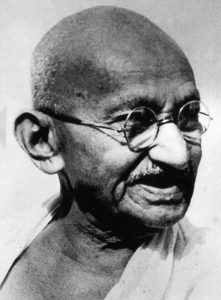
and nationalist leader Mahatma
Gandhi
Mahatma Gandhi
Leader of the Indian National Movement
FROM IN YOUNG INDIA: (2)
“I wanted to know the best of the life of one who holds today an undisputed sway over the hearts of millions of mankind…. I became more than ever convinced that it was not the sword that won a place for Islam in those days, in the scheme of life. It was the rigid simplicity, the utter self-effacement of the Prophet, the scrupulous regard for pledges, his intense devotion to his friends and followers, his intrepidity, his fearlessness, his absolute trust in God and in his own mission. These, and not the sword, carried everything before them and surmounted every obstacle. When I closed the second volume [of a book on the Prophet’s biography], I was sorry there was not more for me to read of that great life.”
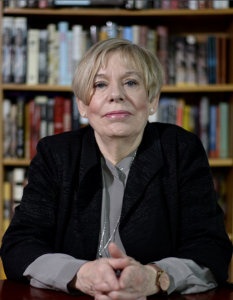
Karen Armstrong
Renowned author & scholar
FROM MOHAMMED: A BIOGRAPHY OF THE PROPHET:
“Muhammad had to start virtually from scratch and work his way towards the radical monotheistic spirituality of his own. When he began his mission, a dispassionate observer would not have given him a chance. The Arabs, he might have objected, were just not ready for monotheism: they were not sufficiently developed for this sophisticated vision [that is Tauheed, belief in the Unity of God]. In fact, to attempt to introduce it on a large scale in this violent, terrifying society, could be extremely dangerous and Muhammad would be lucky to escape with his life.
Indeed, Muhammad was frequently in deadly peril and his survival was a near-miracle. But he did succeed. By the end of his life he had laid an axe to the root of the chronic cycle of tribal violence that afflicted the region and paganism was no longer a going concern. The Arabs were ready to embark on a new phase of their history.” (3)
REFERRING TO CHRISTIANITY AND THE WEST, SHE WROTE:
“Finally it was the West, not Islam, which forbade the open discussion of religious matters. At the time of the Crusades, Europe seemed obsessed by a craving for intellectual conformity and punished its deviants with a zeal that has been unique in the history of religion. The witch-hunts of the inquisitors and the persecution of Protestants by the Catholics and vice versa were inspired by abtruse theological opinions, which in both Judaism and Islam were seen as private and optional matters. Neither Judaism nor Islam share the Christian conception of heresy, which raises human ideas about the divine to an unacceptably high level and almost makes them a form of idolatry.” (4)
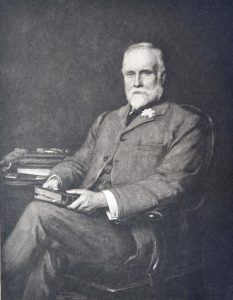
Reverend Bosworth Smith
The famous Christian historian
FROM MUHAMMAD AND MUHAMMADANISM, WROTE:
“Head of the State as well as of the Church, he was Caesar and Pope in one; but he was Pope without Pope’s pretensions and Caesar without the legions of Caesar: without a standing army, without a bodyguard, without a palace, without a fixed revenue; if ever any man had the right to say that he ruled by the right divine, it was Mohammed, for he had all the power without its instruments and without its supports.” (5)
“Those who knew him best, his wife, his eccentric slave, his cousin, his earliest friend – he who, as Mohammed said, alone of his converts, ‘turned not back, neither was perplexed’ – were the first to recognise his mission [that is, his prophethood]. The ordinary lot of a prophet was in his case reversed; he was not without honour save among those who did not know him well.” (6)
“The practices that Mohammed forbade, and not forbade only, but abolished, human sacrifices [that is, sacrificing humans] and the murder of female infants, and blood feuds, and unlimited polygamy, and wanton cruelty to slaves, and drunkenness, and gambling, would have gone unchecked in Arabia and the adjoining countries.” (7)
“On the whole, the wonder is to me not how much, but how little, under different circumstances, Mohammed differed from himself. In the shepherd of the desert [when he tended sheep], in the Syrian trader, in the solitary of Mount Hira, in the reformer in the minority of one, in the exile of Medina, in the acknowledged conqueror, in the equal of the Persian Chosroes and the Greek Heraclius, we can still trace a substantial unity. I doubt whether any other man, whose external conditions changed so much, ever himself changed less to meet them: the accidents are changed, the essence seems to me to be the same in all.” (8)
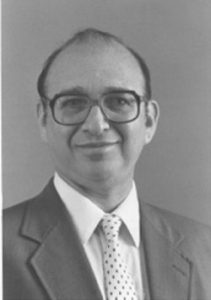
Michael H. Hart
Renowned author & scholar
FROM A RANKING OF THE MOST INFLUENTIAL PERSONS IN HISTORY,CHOSE THE PROPHET MUHAMMADSA TO TOP THE LIST. THOUGH MUSLIMS WOULD DISAGREE WITH ELEMENTS OF HIS ASSESSMENT, HIS TESTIMONY IS STILL REVEALING:
“My choice of Muhammad to lead the list of the world’s most influential persons may surprise some readers and may be questioned by others, but he was the only man in history who was supremely successful on both the religious and secular level.” (9)
“How, then, is one to assess the overall impact of Muhammad on human history? Like all religions, Islam exerts an enormous influence upon the lives of its followers. It is for this reason that the founders of the world’s great religions all figure prominently in this book. Since there are roughly twice as many Christians as Muslims in the world, it may initially seem strange that Muhammad has been ranked higher than Jesus. There are two principal reasons for that decision First, Muhammad played a far more important role in the development of Islam than Jesus did in the development of Christianity. Although Jesus was responsible for the main ethical and moral precepts of Christianity (insofar as those differed from Judaism), St. Paul was the main developer of Christian theology, its principal proselytizer, and the author of a large portion of the New Testament.
Muhammad, however, was responsible for both the theology of Islam and its main ethical and moral principles. In addition, he played the key role in proselytizing the new faith, and in establishing the religious practices of lslam. Moreover, he is the author of the Muslim holy scriptures, the Quran, a collection of certain of Muhammad’s insights that he believed had been directly revealed to him by Allah. Most of these utterances were copied more or less faithfully during Muhammad’s lifetime and were collected together in authoritative form not long after his death. The Quran, therefore, closely represents Muhammad’s ideas and teachings and to a considerable extent his exact words. No such detailed compilation of the teachings of Christ has survived. Since the Quran is at least as important to Muslims as the Bible is to Christians, the influence of Muhammad through the medium of the Quran has been enormous. It is probable that the relative influence of Muhammad on Islam has been larger than the combined influence of Jesus Christ and St. Paul on Christianity. On the purely religious level, then, it seems likely that Muhammad has been as influential in human history as Jesus.” (10)
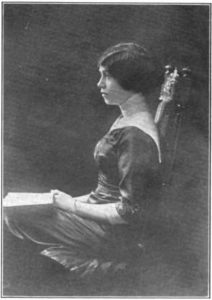
Ruth Cranston
American author
FROM THE STORY OF THE RELIGIONS OF THE UNITED NATIONS (1946):(11)
“Muhammad never instigated fighting and bloodshed. Every battle he fought was in rebuttal. He fought in order to survive… and he fought with the weapons and in fashion of his time. Certainly no Christian nation of 140,000,000 people [as this book was published in 1949] who today dispatch 120,000 helpless civilians with a single bomb, can look askance at a leader who at his worst killed a bare five or six hundred.”
“The slayings of the Prophet of Arabia in the benighted and bloodthirsty age of the seventh century look positively puerile compared with our own, in this ‘advanced’ and enlightened twentieth. Not to mention the mass slaughter by the Christians during the Inquisition and the Crusades – when, Christian warriors proudly recorded, they ‘waded ankle-deep in the gore of the Muslim infidels.”
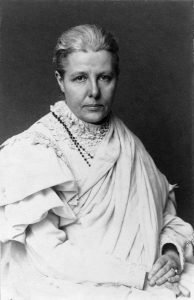
Annie Besant
British social reformer & writer
FROM THE LIFE AND TEACHINGS OF MUHAMMAD:(12)
“It is impossible for anyone who studies the life and character of the great Prophet of Arabia, who knows how he taught and how he lived, to feel anything but reverence for that mighty Prophet, one of the great messengers of the Supreme. And although in what I put to you I shall say many things which may be familiar to many, yet I myself feel whenever I re-read them, a new way of admiration, a new sense of reverence for that mighty Arabian teacher.”
(1)A. De Lamartine. History of Turkey (English Translation). D. Appleton & Co., NY. p.155 (1855-7)
(2)Mahatma Gandhi. Young India. September 23rd 1924.
(3, 4)Karen Armstrong. Muhammad – A Biography of the Prophet. Harper Collins Publishers., NY. p.53-54 (1993).
5, 6, 7, 8)Rev. Bosworth Smith. Character of Muhammad. In: MOHAMMAD AND MOHAMMADANISM. Smith, Elder & Co., London. p. 235 (1876).
(9, 10 )Michael H. Hart. THE 100: A RANKING OF THE MOST INFLUENTIAL PERSONS IN HISTORY. Carol publishing group., p.3.
(11 )Ruth Cranston. World Faith. Harper and Row Publishers., NY. P. 155 (1949).
(12)Annie Besant. The Life and Teachings of Muhammad. Theosophical Publishing House., India. p. 4 (1932).